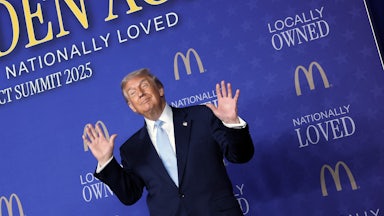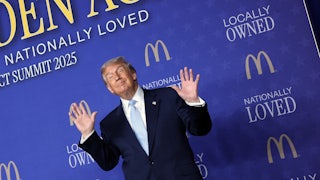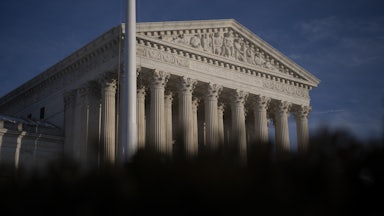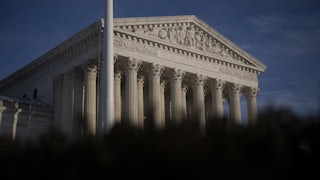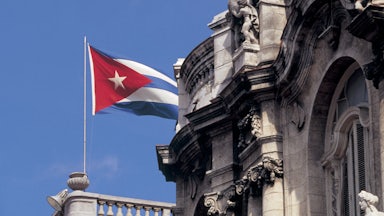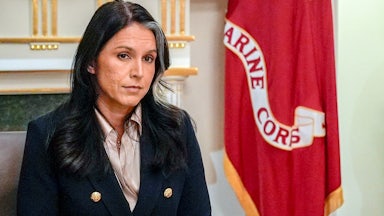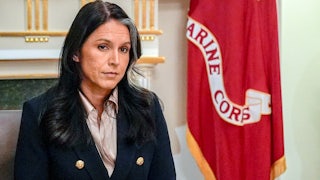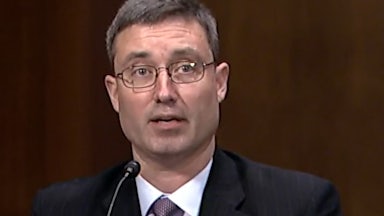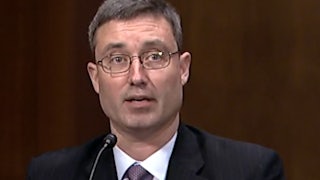Last week’s ruling by an obscure federal court on President Donald Trump’s tariff policy may be the most critical judicial decision of these first few months of Trump’s second term. A three-judge panel on the U.S. Court of International Trade held that Trump’s “Liberation Day” tariffs in April were unlawful, effectively striking down the White House’s flagship economic policy.
The coalition of small-business owners that brought the lawsuit had raised a variety of legal and constitutional objections to Trump’s tariff policies. The panel concluded that any of them would suffice. “Regardless of whether the court views the president’s actions through the nondelegation doctrine, through the major questions doctrine, or simply with separation of powers in mind, any interpretation of [the International Emergency Economic Powers Act of 1977] that delegates unlimited tariff authority is unconstitutional,” it explained.
Since a federal appeals court quickly blocked the ruling from going into effect while legal proceedings continue, however, the economic and legal implications are minimal—that is, until the Supreme Court is forced to step in and resolve this dispute. For now, the ruling’s greatest impact may be to widen a public fissure between Trump and the conservative legal movement.
In an unusually long post on his personal social media website last week, Trump described the court’s ruling in apocalyptic terms. “The ruling by the U.S. Court of International Trade is so wrong, and so political!” he claimed “Hopefully, the Supreme Court will reverse this horrible, Country threatening decision, QUICKLY and DECISIVELY. Backroom ‘hustlers’ must not be allowed to destroy our Nation!”
He even inadvertently showed why the ruling was correct in his explanation for why it was wrong. “The horrific decision stated that I would have to get the approval of Congress for these Tariffs,” he complained. “In other words, hundreds of politicians would sit around D.C. for weeks, and even months, trying to come to a conclusion as to what to charge other Countries that are treating us unfairly.” While Trump may wish it says otherwise, that is precisely what the Constitution requires by placing tariffs within Congress’s core powers.
But the most interesting part of his statement was a lengthy exhortation on the conservative legal movement and Leonard Leo, one of its leading figures. The three-judge panel consisted of an Obama appointee, a Reagan appointee, and a Trump appointee. That last one, Judge Timothy Reif, drew Trump’s ire in particular. “Where do these initial three Judges come from?” he wondered. “How is it possible for them to have potentially done such damage to the United States of America? Is it purely a hatred of ‘TRUMP?’ What other reason could it be?”
Trump attributed the setback to Leo and other legal conservatives who effectively handpicked most of his administration’s judicial nominees during his first term, including Reif. In doing so, he was unusually candid about how the judicial sausage gets made, so to speak. “I was new to Washington, and it was suggested that I use The Federalist Society as a recommending source on Judges,” he claimed.
This is true in the broadest sense, but it does not really capture the dynamic of what happened in 2016. Antonin Scalia’s unexpected death led to a 4–4 deadlock between liberals and conservatives on the high court. It also created a historic opportunity for Democrats. Filling the vacancy would have given liberals their first five-justice majority on the high court since the 1960s. Senate Republicans, led by then–Majority Leader Mitch McConnell, refused to hold a vote on any of Barack Obama’s nominees to prevent this ideological shift from happening.
At the same time, Trump’s nomination for president that year had created fractures within the Republican Party and raised the possibility that Hillary Clinton would win a four-year term as president—a nightmare scenario for a GOP that had spent the previous three decades treating her as some sort of demonic figure. Though some Republican senators suggested they would maintain the blockade if she won, others were less certain.
At the time, Trump had about as much interest in legal conservative theories as he did in medieval Bulgarian poetry. Conservative legal elites feared that he would choose his own slate of judicial nominees instead of the ones that they had been grooming for a generation. The two camps reconciled after Trump released a short list of Supreme Court nominees that September that he would choose from to replace Scalia if elected. The short list included some of the most prominent conservative jurists at the time; it gave former adversaries like Texas Senator Ted Cruz a rationale to openly endorse him.
After he won and took office, Trump relied on those same conservative legal elites to shape his overall judicial nominee strategy, fulfilling his side of the implicit bargain. “I did so, openly and freely, but then realized that they were under the thumb of a real ‘sleazebag’ named Leonard Leo, a bad person who, in his own way, probably hates America, and obviously has his own separate ambitions,” Trump explained in his recent post. “He openly brags how he controls Judges, and even Justices of the United States Supreme Court—I hope that is not so, and don’t believe it is! In any event, Leo left The Federalist Society to do his own ‘thing.’”
Leo, who was once a top figure in the Federalist Society, took a leave of absence from the organization to advise the White House on judicial nominees during Trump’s first term. His outsize role in the process—and his ensuing status as the de facto face of the conservative legal movement—led to magazine-length profiles that cast him as the power behind the Supreme Court’s figurative thrones. It also made Leo a major recipient of donations from right-wing billionaires who hoped to build upon his success.
I would be surprised, for what it’s worth, if Leo ever “bragged” that he “controls” any judges or justices, at least in such crude terms. The conservative legal movement’s typical approach is to identify and screen like-minded potential nominees who will advance the movement’s goals of their own free will. More direct forms of coercion and control would not only be a violation of judicial ethics but a lot of unnecessary work.
Trump’s agita over the tariff ruling has him essentially retconning his first term in office, with Leo and the Federalist Society now recast as deep-cover adversaries. “I am so disappointed in The Federalist Society because of the bad advice they gave me on numerous Judicial Nominations,” Trump continued. “This is something that cannot be forgotten!” It’s true that Trump appointees have ruled against him and his policies from time to time, as is to be expected in a rule-of-law society. For a president who always expects fealty and submission, that would be tough to stomach.
The Roberts court has occasionally been an obstacle for some of the Trump administration’s policies. At the same time, all three of Trump’s Supreme Court nominees helped gut the disqualification clause so he could run for a second term last year. Two of them then voted to invent “presidential immunity” out of thin air to free him from most of his legal woes. Never before have a president’s own Supreme Court appointments rewritten the Constitution so drastically for that president’s personal benefit.
It would be easy to dismiss Trump’s fulminations; he often lashes out at his allies before later reconciling with them. But there are other signs that he is retooling his approach to judicial nominations for his second term in ways that might disempower the conservative legal establishment. Last week, for example, Trump announced that he would nominate Emil Bove to a vacant seat on the Third Circuit Court of Appeals.
“Emil is SMART, TOUGH, and respected by everyone,” the president claimed in a post on his personal social media network. “He will end the Weaponization of Justice, restore the Rule of Law, and do anything else that is necessary to, MAKE AMERICA GREAT AGAIN. Emil Bove will never let you down!” Bove has certainly never let Trump down. After working as one of his personal defense lawyers after Trump’s first term, Bove joined the Justice Department earlier this year and helped purge it of lawyers who expressed ethical or policy concerns about the Trump administration’s tactics.
Though Bove is undoubtedly conservative compared to, say, Justice Sonia Sotomayor, he is not one of the rising stars that the conservative legal establishment had groomed for future judicial vacancies and is not part of that powerful social network. The pick prompted significant pushback from legal conservatives on social media. “Whether the White House wants to acknowledge it or not, the caliber of its early judicial nominations will affect the number of vacancies it gets to fill,” Jonathan Adler, a William & Mary law professor, wrote on Twitter last month. “This is why the Bove nomination was a risky pick (even apart from the merits).”
Ed Whelan, a prominent legal conservative who played a role in the Brett Kavanaugh confirmation fight, shared Adler’s post and added more commentary in favor of it. “Just yesterday, a very conservative appellate judge told me that s/he wouldn’t take senior status because of concerns over who would be picked as successor,” Whelan claimed. In a later National Review column, he described Bove’s personal and professional faults at length. He also warned that Bove could be in line for the Supreme Court if another vacancy occurs during Trump’s second term. “Republican senators who have the foresight and sense to prevent this scenario should defeat Bove’s nomination,” Whelan concluded.
The conservative legal movement’s problem is that Trump does not really need them anymore. His grip over the Republican Party is ironclad. His various legal troubles have exposed him to a wide range of lawyers to install in the Justice Department, the White House counsel’s office, and the federal bench without deferring to Leo’s Rolodex. Trump values personal loyalty over ideological purity, so he does not really care what his appointees think about the nondelegation doctrine or Humphrey’s Executor or originalism, except insofar as it benefits Trump.
As a result, the movement’s 50-year quest to entrench its particular legal philosophy in American constitutional law has perhaps never been more successful and never been in greater peril. Legal conservatives finally achieved their goal of a Supreme Court that would strike down Roe v. Wade, gut civil rights laws, and demolish federal regulatory agencies with ease. Along the way they also installed a president whose increasing willingness to defy court orders could turn the federal judiciary into the world’s most prestigious debate club.
The Supreme Court’s conservative justices could make peace by overturning the panel’s ruling on Trump’s tariffs when they inevitably get the chance. In doing so, they would destroy any remaining credibility for their favored doctrines. Trump is imposing recession-inducing tariffs on America’s largest trading partners by invoking a 1977 law that doesn’t even mention tariffs and has never been previously used to raise them. If the major questions doctrine can’t stop that, then it exists only to derail Democratic presidencies and can thus be treated as the sham that it is.
Alternatively, the court could strike down the tariffs, save the American economy from self-inflicted disaster, and try to maintain the legitimacy of its ideological project. But that could also bring about a direct confrontation with a lawless president who is already willing to openly ignore court orders. After all, if Trump decided to continue collecting the tariffs anyway, what could Chief Justice John Roberts do about it? Direct the marshals to seize control of the Treasury’s payment system like DOGE did and give everyone refunds on Venmo?
I do not doubt that some—and perhaps many—legal conservatives would still accept the current state of affairs over one where a Supreme Court justice appointed by Hillary Clinton is casting the decisive vote on gun rights cases and making it impossible to overturn Roe for another 30 years. Leonard Leo himself may even be among them. But some of the ones who tolerated Trump surely must have heartburn over the scorpion-and-frog situation in which they now find themselves. If so, they’ve earned it.

